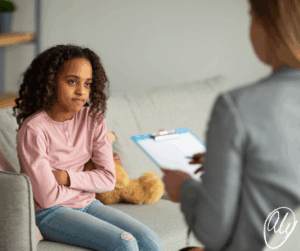Fixing behavior won’t heal what’s really hurting.
You’re doing everything right… so why does nothing change?
You’ve booked the sessions, rearranged your schedule, done everything right. You found an experienced professional – but teen therapy isn’t working the way you hoped.
Your teen still slams doors, shuts down, or says nothing at all, and you’re left wondering why therapy isn’t helping my teen.
If that sounds familiar, you’re not alone.
Parenting teens with anxiety or ADHD is exhausting – and even with therapy, the results can feel like one step forward, two steps back.

The Hidden Message Your Teen Hears
When parents rush to therapy before creating emotional safety at home, it can backfire—fast.
Even with the best intentions, your teen might hear:
“You’re the problem that needs fixing.”
And that’s exactly how I felt when I was their age. This is one of the biggest reasons teen therapy isn’t working for so many families I talk to.
I was that teen.
Straight-A student. Award-winning athlete.
Then, almost overnight, everything fell apart.
I stopped showing up for practices.
My grades tanked.
My temper exploded.
Inside, I was scared, angry, and completely lost.
My parents did what made sense—they found me a counselor.
But what it felt like was this:
“You’re broken. Go talk to someone who can fix you.”
I didn’t need fixing. I needed understanding.
Someone to see that my outbursts were pain, not defiance.
Someone to notice that I was drowning in confusion, ADHD, and anxiety no one recognized.
Therapy wasn’t wrong. It just wasn’t enough.
Why Teen Therapy Doesn’t Always Work
Most teens don’t resist therapy because they don’t care.
They resist because they feel blamed, labeled, or misunderstood.
They’re thinking:
“My parents want someone else to tell me what’s wrong with me.”
“Why talk to a stranger when no one at home listens?”
“If I tell the truth, it’ll just get used against me.”
Most teens don’t resist therapy because they don’t care.
They resist because they feel blamed, labeled, or misunderstood.
They’re thinking:
“My parents want someone else to tell me what’s wrong with me.”
“Why talk to a stranger when no one at home listens?”
“If I tell the truth, it’ll just get used against me.”
When that’s the starting point, no therapist in the world can make progress—because your teen’s wall is already up.
Therapy works best after connection, not before it.
What Your Teen Actually Needs First
If you’re parenting teens with anxiety or ADHD, emotional safety isn’t optional—it’s the foundation that helps therapy (and home life) start to work.
Before your teen can open up to anyone, they need to feel safe with you.
That starts at home—not in an office.
Here’s what that looks like in real life:
✅ Empathy before evaluation.
When your teen shares something hard, resist the urge to fix it. Just listen.
✅ Curiosity instead of control.
Ask, “Help me understand what’s happening for you right now.”
✅ Connection before correction.
Address what’s under the behavior, not just the behavior itself.
Because the truth is—therapy can help.
But you’re the foundation it builds on.
What Happens When That Shift Takes Place
When parents create emotional safety first, everything changes.
Conversations open up. Homework battles ease.
Teens start regulating instead of reacting.
As one mom told me:
“After years of therapy and endless fights, I finally stopped trying to control him. Within weeks, my son started coming to me on his own. Therapy finally started working because home felt safe.”
That’s the power of connection—it turns everything else on.
The Real Fix Starts With Relationship
Therapy is a tool, not a shortcut.
It can support healing—but it can’t replace you.
When your teen feels seen instead of studied, believed in instead of blamed, that’s when lasting change begins.
So before you make another appointment, start here:
A conversation.
A moment of curiosity.
A tiny pause between their reaction and your response.
Because those small shifts at home?
They’re what make therapy work—if your teen even needs it at all.
You Don’t Need Another Therapist. You Need the Right Tools - and Real Results.
Because therapy only works when home feels safe—when you’re not walking on eggshells or bracing for another meltdown before breakfast. When your teen finally starts managing their schoolwork without being chased.
That’s exactly what How to End the School Power Struggle helps you do.
It’s where loving, exhausted parents learn to turn school stress into teamwork—without power struggles, punishment, or shame.
Inside, you’ll get:
✅ Practical tools to rebuild trust so your teen actually talks to you.
✅ Simple strategies that make mornings calm, homework doable, and family time peaceful again.
✅ Science-backed guidance to understand ADHD, anxiety, and motivation in a way that finally makes sense.
Imagine: no more yelling before school.
No more late-night guilt spirals wondering where you went wrong.
Just a calmer home, a confident teen who’s finding their way,
and you—finally feeling like the parent you always hoped to be.
You don’t have to do this alone.
And your teen doesn’t need fixing.
They need connection—and you can create that starting now.
If you’re tired of wondering why therapy isn’t helping your teen, it’s time to stop guessing.
Learn how to create emotional safety, reduce conflict, and finally see results that last – both in and outside of therapy.
P.S. If you’re sick of being the “bad cop” every day and wondering if your teen will ever turn things around, you don’t have to carry that fear alone. This is where your teen starts taking responsibility for school, chores, and their choices—without you forcing it: [Start Here]

